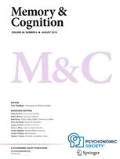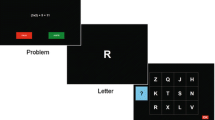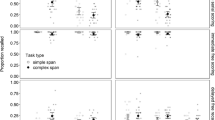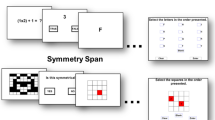Abstract
Although individuals with high and low working memory (WM) span appear to differ in the extent to which irrelevant information interferes with their performance on WM tasks, the locus of this interference is not clear. The present study investigated whether, when performing a WM task, high- and low-span individuals differ in the activation of formerly relevant, but now irrelevant items, and/or in their ability to correctly identify such irrelevant items. This was done in two experiments, both of which used modified complex WM span tasks. In Experiment 1, the span task included an embedded lexical decision task designed to obtain an implicit measure of the activation of both currently and formerly relevant items. In Experiment 2, the span task included an embedded recognition judgment task designed to obtain an explicit measure of both item and source recognition ability. The results of these experiments indicate that low-span individuals do not hold irrelevant information in a more active state in memory than high-span individuals, but rather that low-span individuals are significantly poorer at identifying such information as irrelevant at the time of retrieval. These results suggest that differences in the ability to monitor the source of information, rather than differences in the activation of irrelevant information, are the more important determinant of performance on WM tasks.




Similar content being viewed by others
References
Baddeley, A. D. (1986). Working memory. Oxford: Oxford University Press.
Baddeley, A. D., & Hitch, G. J. (1974). Working memory. In G. Bower (Ed.), The psychology of learning and motivation (Vol. 8, pp. 47–90). New York: Academic Press.
Bunting, M. (2006). Proactive interference and item similarity in working memory. Journal of Experimental Psychology: Learning, Memory, and Cognition, 32, 183–196.
Chen, J., Hale, S., & Myerson, J. (2007). Predicting the size of individual and group differences on speeded cognitive tasks. Psychonomic Bulletin & Review, 14, 534–541.
Daneman, M., & Carpenter, P. A. (1980). Individual differences in working memory and reading. Journal of Verbal Learning and Verbal Behavior, 19, 450–466.
Engle, R. W. (2002). Working memory capacity as executive attention. Current Directions in Psychological Science, 11, 19–23.
Engle, R. W., Tuholski, S. W., Laughlin, J. E., & Conway, A. R. A. (1999). Working memory, short-term memory, and general fluid intelligence: A latent-variable approach. Journal of Experimental Psychology: General, 128, 309–331.
Greenberg, R., & Underwood, B. J. (1950). Retention as a function of stage of practice. Journal of Experimental Psychology, 40, 452–457.
Hasher, L., Lustig, C., & Zacks, R. (2007). Inhibitory mechanisms and the control of attention. In A. Miyake, A. R. A. Conway, C. Jarrold, M. J. Kane, & J. N. Towse (Eds.), Variation in working memory (pp. 227–249). New York: Oxford University Press.
Hasher, L., & Zacks, R. T. (1988). Working memory, comprehension, and aging: A review and a new view. In G. H. Bower (Ed.), The psychology of learning and motivation: Advances in research and theory (Vol. 22, pp. 193–225). New York: Academic Press.
Just, M. A., & Carpenter, P. A. (1992). A capacity theory of comprehension: Individual differences in working memory. Psychological Review, 99, 122–149.
Kane, M. J., & Engle, R. W. (2000). Working-memory capacity, proactive interference, and divided attention: Limits on long-term memory retrieval. Journal of Experimental Psychology: Learning, Memory, and Cognition, 26, 336–358.
Keppel, G., & Underwood, B. J. (1962). Proactive inhibition in short-term retention of single items. Journal of Verbal Learning and Verbal Behavior, 1, 153–161.
Kyllonen, P. C., & Stephens, D. L. (1990). Cognitive abilities as determinants of success in acquiring logic skill. Learning and Individual Differences, 2, 129–160.
Lee, I. A., & Preacher, K. J. (2013). Calculation for the test of the difference between two dependent correlations with one variable in common [Computer software]. Available from http://quantpsy.org
Lilienthal, L., Tamez, E., Myerson, J., & Hale, S. (2013). Predicting performance on the Raven’s Matrices: The roles of associative learning and retrieval efficiency. Journal of Cognitive Psychology, 25, 704–716.
Macmillan, N. A., & Creelman, C. D. (2005). Detection Theory: A User's Guide (2nd ed.). Mahwah, N.J.: Lawrence Erlbaum Associates.
May, C. P., Hasher, L., & Kane, M. J. (1999). The role of interference in memory span. Memory and Cognition, 27, 759–767.
Meyer, D. E., & Schvaneveldt, R. W. (1971). Facilitation in recognizing pairs of words: Evidence of a dependence between retrieval operations. Journal of Experimental Psychology, 90, 227–234.
Oberauer, K. (2005). Binding and inhibition in working memory: Individual and age differences in short-term retention. Journal of Experimental Psychology: General, 134, 368–387.
Ratcliff, R., Hockley, W., & McKoon, G. (1985). Components of activation: Repetition and priming effects in lexical decision and recognition. Journal of Experimental Psychology: General, 114, 435–450.
Raven, J., Raven, J. C., & Court, J. H. (1998). Manual for Raven’s Progressive Matrices and Vocabulary Scales. Section 4: The Advanced Progressive Matrices. Oxford: Oxford Psychologists Press.
Rose, N. S. (2013). Individual differences in working memory, secondary memory, and fluid intelligence: Evidence from the levels-of-processing span task. Canadian Journal of Experimental Psychology, 67, 260–270.
Rosen, V. M., & Engle, R. W. (1998). Working memory capacity and suppression. Journal of Memory and Language, 39, 418–436.
Turner, M. L., & Engle, R. W. (1989). Is working memory capacity task dependent? Journal of Memory and Language, 28, 127–154.
Unsworth, N. (2007). Individual differences in working memory capacity and episodic retrieval: Examining the dynamics of delayed and continuous distractor free recall. Journal of Experimental Psychology: Learning, Memory, and Cognition, 33, 1020–1034.
Unsworth, N., & Brewer, G. A. (2009). Examining the relationships among item recognition, source recognition, and recall from an individual differences perspective. Journal of Experimental Psychology: Learning, Memory, and Cognition, 35, 1578–1585.
Unsworth, N., & Brewer, G. A. (2010). Variation in working memory capacity and intrusions: Differences in generation or editing? European Journal of Cognitive Psychology, 22, 990–1000.
Unsworth, N., & Engle, R. W. (2005). Individual differences in working memory capacity and learning: Evidence from the serial reaction time task. Memory and Cognition, 33, 213–220.
Unsworth, N., & Engle, R. W. (2007a). The nature of individual differences in working memory capacity: Active maintenance in primary memory and controlled search from secondary memory. Psychological Review, 114, 104–132.
Unsworth, N., & Engle, R. W. (2007b). On the division of short-term and working memory: An examination of simple and complex span and their relation to higher order abilities. Psychological Bulletin, 133, 1038–1066.
Acknowledgments
The efforts of Lindsey Lilienthal were supported by NIA Training Grant AG00030.
Author information
Authors and Affiliations
Corresponding author
Rights and permissions
About this article
Cite this article
Lilienthal, L., Rose, N.S., Tamez, E. et al. Individuals with low working memory spans show greater interference from irrelevant information because of poor source monitoring, not greater activation. Mem Cogn 43, 357–366 (2015). https://doi.org/10.3758/s13421-014-0465-3
Published:
Issue Date:
DOI: https://doi.org/10.3758/s13421-014-0465-3




